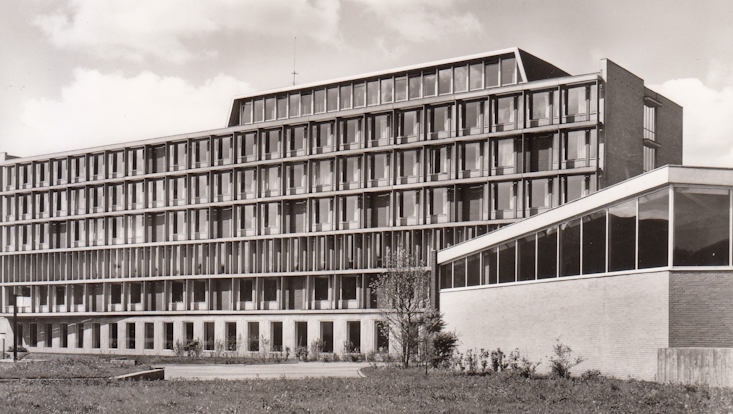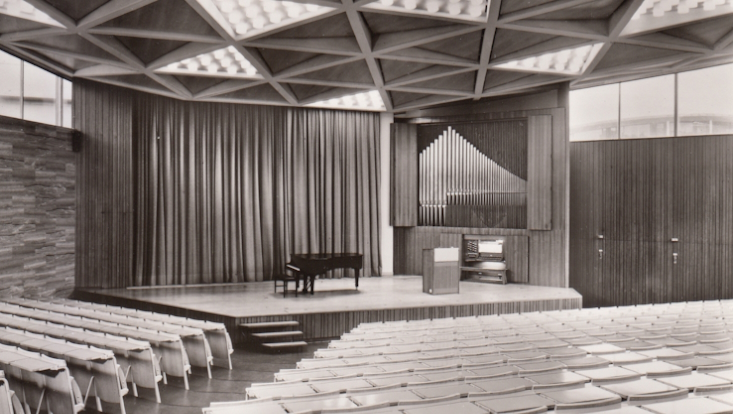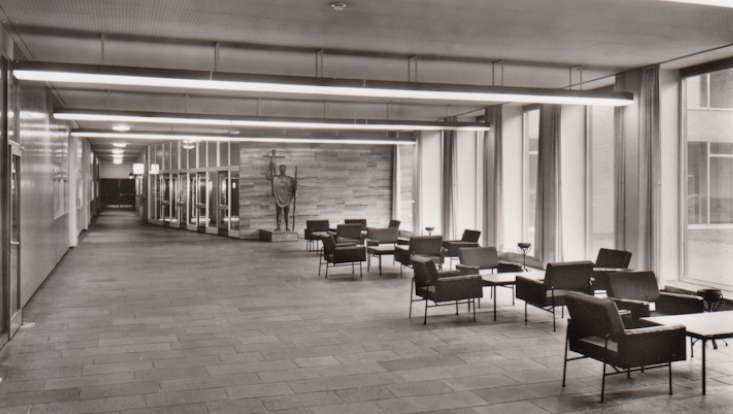The history of the faculty
The history of the faculty

UHH/Dichant
In the following chronology, which extends from 1900 to the present day, a few selected highlights of the history of the Faculty of Education are shown. Of course, this presentation is abbreviated and therefore does not claim to be complete.
1900 - 1919
Education was taught as a subject in the General Lecture Series, the institution antecedent to Universität Hamburg. This is also where Ernst Meumann and William Stern taught at the Chair for Philosophy.
In 1912, Hamburg’s adult education teachers demanded for the first time that prospective teachers be trained at a university, where they could receive an academically sound education in teaching.
____________________________________________________________________________________
1920 - 1939
Four years later, Gustav Deuchler was appointed to the first professorship in the newly founded Educational Seminar at Universität Hamburg, itself founded in 1919. Prospective teachers for upper-level schools received training here until 1926; teachers for adult education centers began to receive training in 1927.
Shortly thereafter, formal training was offered to teachers of commercial studies—previously, like their colleagues at adult education centers, they had been able to access a university education at only a few places. The curriculum did not focus solely on the classroom and lesson plans but also on general educational issues. Between 1927 and 1931, the number of students climbed to over 1,000, an almost tenfold increase.
After the National Socialists seized power in early 1933, William Stern, the head of the Psychological Institute in the General Lecture Series, was immediately dismissed. In September 1933, the institute was put into the administrative hands of the National Socialist educator Deuchler.
____________________________________________________________________________________
1940 - 1959
Teacher training resumed when the University was newly founded after the demise of National Socialism. In 1947, the Pedagogical Institute was founded alongside what had been renamed as the Seminar for Education. The Pedagogical Institute was established primarily to provide future teachers with practical training. In 1959, the building at Von-Melle-Park 8 was ceremoniously dedicated to the training of teachers.
It was the first building completed on the Main Campus, followed by the “Philosophenturm” and the main auditorium, or Audimax.
1960 - 1979

UHH/Dichant
In 1961, the introduction of the Magister exam, which did not constitute a teaching qualification, laid the groundwork for today’s undergraduate education programs. Criticisms leveled by student protesters (the “68-ers”) ultimately led to a new university law that shifted power from full professors to faculties and departments. In the wake of the dissolution of the Philosophy Faculty, the Seminar for Education and the Pedagogical Institute were consolidated into the Department of Education, which was responsible for sub-disciplines, teacher training, and teaching subjects.
The degree program offering the Diplom was introduced the same year, offering students a university education covering a broad range of topics in the social sciences, education, and early childhood education beyond the more narrow confines of schools.
____________________________________________________________________________________
1980 - 1989

UHH/Scholz
The department was organized into subject committees until 1983, when these were consolidated into 11 institutes. The department’s areas of focus were educational theory, comparative international and intercultural perspectives, the history of education, school education (with a focus on school development, research on the teaching profession, and teaching), special needs education, vocational and economic education, social pedagogy, adult and further education, and subject-specific didactics for the teaching subjects offered in Hamburg. The department was able to offer teacher training across the board.
____________________________________________________________________________________
1990 - 1999
In the 1990s, the Department of Education was the largest of the University’s 19 departments, with 100 professors and 20 assistants. It offered programs leading to a Magister and Diplom as well as subjects in educational science, early childhood and primary education, and special needs education for the state examinations required for a teaching qualification. The commercial and technical subject areas for teacher training in vocational education were transferred to the Hamburg University of Technology (TUHH) and the Department of Chemistry; vocational and economic education remained within the department.
____________________________________________________________________________________
2000 - 2009

UHH/Möller
Another reform of the Hamburg higher education act (Hamburgisches Hochschulgesetz, HmbHG) in 2005 led to the consolidation of the University’s 19 departments into six faculties. The subjects educational science, psychology, and human movement science merged into a single faculty under the leadership of Prof. Dr. Karl-Dieter Schuck. At the same time, a multi-stage system of study was introduced at Universität Hamburg. In 2007, bachelor’s programs were introduced for the first time in the faculty, followed by master’s programs in 2010. Teacher training also became a multi-stage system.
____________________________________________________________________________________
2010 - heute

UHH/Scholz
In 2014, the Faculty of Education, Psychology and Human Movement split, and the Faculty of Education was founded with five departments. Intensive negotiations involving several external reviews led to a fundamental staff change, with a substantially lower number of full professors and an increase in other academic staff. Throughout the decade, research activities concentrated into three major areas: language and education of the twenty-first century (the University’s profile initiative Literacy in Diversity Settings/ Linguistic Diversity), the professionalization of teaching, and uncertainty as a dimension of educational action.
History of special education in Hamburg
An overview of the history of special education in Hamburg can be found on the website of PBB (Pädagogik bei Behinderung und Benachteiligung).



